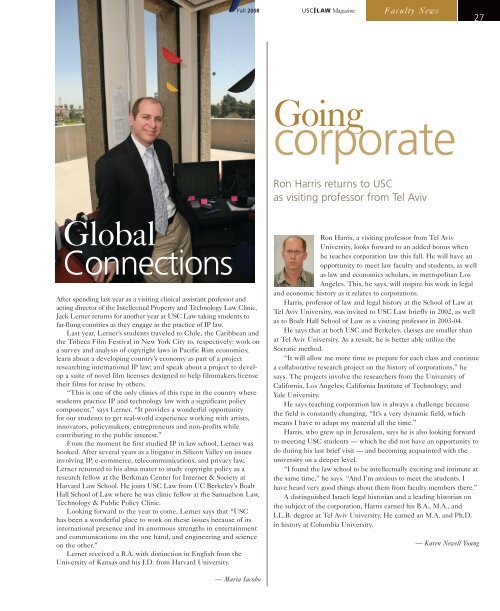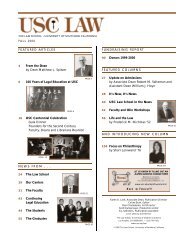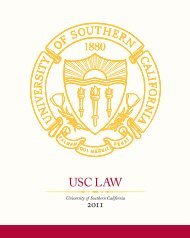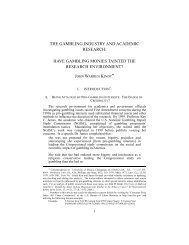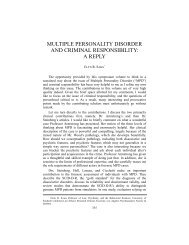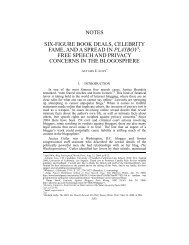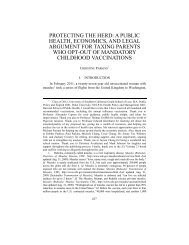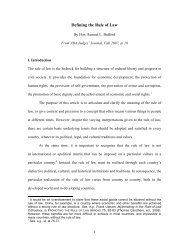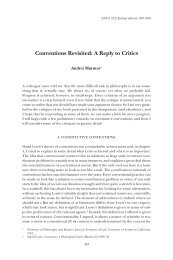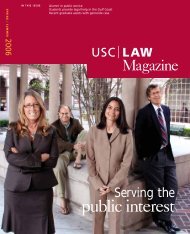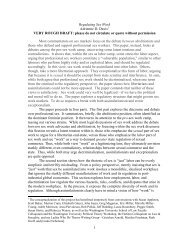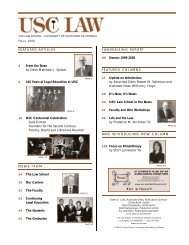Magazine - USC Gould School of Law - University of Southern ...
Magazine - USC Gould School of Law - University of Southern ...
Magazine - USC Gould School of Law - University of Southern ...
You also want an ePaper? Increase the reach of your titles
YUMPU automatically turns print PDFs into web optimized ePapers that Google loves.
Global<br />
Connections<br />
Fall 2008<br />
After spending last year as a visiting clinical assistant pr<strong>of</strong>essor and<br />
acting director <strong>of</strong> the Intellectual Property and Technology <strong>Law</strong> Clinic,<br />
Jack Lerner returns for another year at <strong>USC</strong> <strong>Law</strong> taking students to<br />
far-flung countries as they engage in the practice <strong>of</strong> IP law.<br />
Last year, Lerner’s students traveled to Chile, the Caribbean and<br />
the Tribeca Film Festival in New York City to, respectively: work on<br />
a survey and analysis <strong>of</strong> copyright laws in Pacific Rim economies;<br />
learn about a developing country’s economy as part <strong>of</strong> a project<br />
researching international IP law; and speak about a project to develop<br />
a suite <strong>of</strong> novel film licenses designed to help filmmakers license<br />
their films for reuse by others.<br />
“This is one <strong>of</strong> the only clinics <strong>of</strong> this type in the country where<br />
students practice IP and technology law with a significant policy<br />
component,” says Lerner. “It provides a wonderful opportunity<br />
for our students to get real-world experience working with artists,<br />
innovators, policymakers, entrepreneurs and non-pr<strong>of</strong>its while<br />
contributing to the public interest.”<br />
From the moment he first studied IP in law school, Lerner was<br />
hooked. After several years as a litigator in Silicon Valley on issues<br />
involving IP, e-commerce, telecommunications, and privacy law,<br />
Lerner returned to his alma mater to study copyright policy as a<br />
research fellow at the Berkman Center for Internet & Society at<br />
Harvard <strong>Law</strong> <strong>School</strong>. He joins <strong>USC</strong> <strong>Law</strong> from UC Berkeley’s Boalt<br />
Hall <strong>School</strong> <strong>of</strong> <strong>Law</strong> where he was clinic fellow at the Samuelson <strong>Law</strong>,<br />
Technology & Public Policy Clinic.<br />
Looking forward to the year to come, Lerner says that “<strong>USC</strong><br />
has been a wonderful place to work on these issues because <strong>of</strong> its<br />
international presence and its enormous strengths in entertainment<br />
and communications on the one hand, and engineering and science<br />
on the other.”<br />
Lerner received a B.A. with distinction in English from the<br />
<strong>University</strong> <strong>of</strong> Kansas and his J.D. from Harvard <strong>University</strong>.<br />
— Maria Iacobo<br />
<strong>Magazine</strong><br />
Faculty News<br />
Going<br />
corporate<br />
Ron Harris returns to <strong>USC</strong><br />
as visiting pr<strong>of</strong>essor from Tel Aviv<br />
Ron Harris, a visiting pr<strong>of</strong>essor from Tel Aviv<br />
<strong>University</strong>, looks forward to an added bonus when<br />
he teaches corporation law this fall. He will have an<br />
opportunity to meet law faculty and students, as well<br />
as law and economics scholars, in metropolitan Los<br />
Angeles. This, he says, will inspire his work in legal<br />
and economic history as it relates to corporations.<br />
Harris, pr<strong>of</strong>essor <strong>of</strong> law and legal history at the <strong>School</strong> <strong>of</strong> <strong>Law</strong> at<br />
Tel Aviv <strong>University</strong>, was invited to <strong>USC</strong> <strong>Law</strong> briefly in 2002, as well<br />
as to Boalt Hall <strong>School</strong> <strong>of</strong> <strong>Law</strong> as a visiting pr<strong>of</strong>essor in 2003-04.<br />
He says that at both <strong>USC</strong> and Berkeley, classes are smaller than<br />
at Tel Aviv <strong>University</strong>. As a result, he is better able utilize the<br />
Socratic method.<br />
“It will allow me more time to prepare for each class and continue<br />
a collaborative research project on the history <strong>of</strong> corporations,” he<br />
says. The projects involve the researchers from the <strong>University</strong> <strong>of</strong><br />
California, Los Angeles; California Institute <strong>of</strong> Technology; and<br />
Yale <strong>University</strong>.<br />
He says teaching corporation law is always a challenge because<br />
the field is constantly changing. “It’s a very dynamic field, which<br />
means I have to adapt my material all the time.”<br />
Harris, who grew up in Jerusalem, says he is also looking forward<br />
to meeting <strong>USC</strong> students — which he did not have an opportunity to<br />
do during his last brief visit — and becoming acquainted with the<br />
university on a deeper level.<br />
“I found the law school to be intellectually exciting and intimate at<br />
the same time,” he says. “And I’m anxious to meet the students. I<br />
have heard very good things about them from faculty members there.”<br />
A distinguished Israeli legal historian and a leading historian on<br />
the subject <strong>of</strong> the corporation, Harris earned his B.A., M.A., and<br />
LL.B. degree at Tel Aviv <strong>University</strong>. He earned an M.A. and Ph.D.<br />
in history at Columbia <strong>University</strong>.<br />
27<br />
— Karen Newell Young


